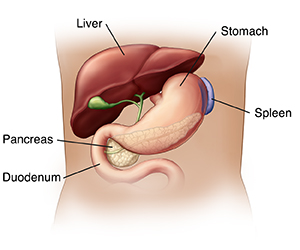A
B
C
D
E
F
G
H
I
J
K
L
M
N
O
P
Q
R
S
T
U
V
W
X
Y
Z
Topic IndexLibrary Index
Click a letter to see a list of conditions beginning with that letter.
Click 'Topic Index' to return to the index for the current topic.
Click 'Library Index' to return to the listing of all topics.
The Pancreas: Anatomy and Functions
Anatomy of the pancreas
The pancreas is a long, tapered organ located across the back of the belly (abdomen), behind the stomach. The right side of the organ is called the head. It's the widest part of the organ. It lies in the curve of the duodenum, the first part of the small intestine. The tapered left side extends slightly upward. It's called the body of the pancreas. It ends in the tail, which is near the spleen.

The pancreas is made up of 2 types of glands:
-
Exocrine. The exocrine gland secretes digestive enzymes. These enzymes are secreted into a network of ducts that join the main pancreatic duct. It runs the length of the pancreas.
-
Endocrine. The endocrine gland consists of the islets of Langerhans. It secretes hormones into the blood.
Functions of the pancreas
The pancreas has digestive and hormonal functions:
-
The enzymes secreted by the exocrine gland in the pancreas help break down carbohydrates, fats, and proteins. These enzymes go down the pancreatic duct into the bile duct in an inactive form. When they go into the duodenum, they are activated. The exocrine tissue also secretes a bicarbonate. It neutralizes stomach acid in the duodenum.
-
There are 3 main hormones secreted by the endocrine gland in the pancreas. Insulin and glucagon help control the level of glucose in the blood. Somatostatin helps control the levels of the other hormones.
Online Medical Reviewer:
Jen Lehrer MD
Online Medical Reviewer:
L Renee Watson MSN RN
Online Medical Reviewer:
Raymond Turley Jr PA-C
Date Last Reviewed:
7/1/2023
© 2000-2024 The StayWell Company, LLC. All rights reserved. This information is not intended as a substitute for professional medical care. Always follow your healthcare professional's instructions.